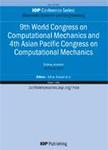版权所有:内蒙古大学图书馆 技术提供:维普资讯• 智图
内蒙古自治区呼和浩特市赛罕区大学西街235号 邮编: 010021

作者机构:Department of Structures and Water Resources College of Engineering Kufa University Najaf Iraq. Department of Building and Construction Engineering University of Technology Baghdad Iraq. Department of Civil Engineering College of Engineering Al-Nahrain University Baghdad Iraq.
出 版 物:《IOP Conference Series: Materials Science and Engineering》
年 卷 期:2018年第433卷第1期
摘 要:The collapse of the structures may be initiated by fire, which is considered one of the most severe risks. However, there are several conditions in which structures may be exposed to elevated temperatures such as nuclear applications; factory procedures; and fires in tunnels or buildings due to accidents or terrorist attacks. Recently, Self-Consolidating Concrete (SCC) has become more broadly used, and there is thus a need to recognise its behaviours when subjected to elevated temperatures, particularly in terms of sustainable SCC. Seven sustainable SCC mixes were thus investigated in this study, each incorporating certain green materials (Portland limestone cement, high volume Class F fly ash, and locally available cement kiln dust (CKD)). All mixes were subjected to temperature levels of 200 °C, 400 °C, 600 °C, and 800 °C for two hours and cooled to room temperature either slowly (air cooling) or rapidly (water cooling). The residual (compressive, splitting, and flexural) strengths and modulus of elasticity were calculated. The results indicated that SCCs with high volumes of Class F fly ash showed the best performance when subjected to elevated temperature.